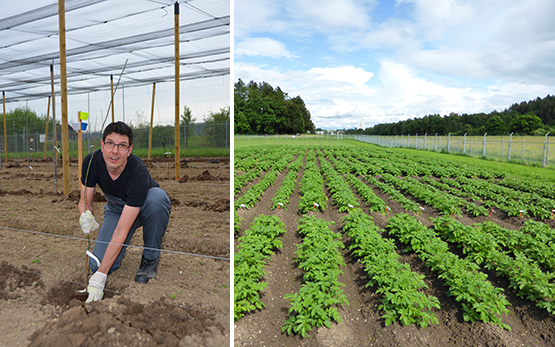Cisgenic apple trees now also on the
Protected Site
Agroscope runs its Protected Site in order to enable field trials with genetically modified plants. The University of Zurich has been conducting trials with powdery mildew-resistant wheat lines on the site since 2014. In addition, Agroscope researchers are testing potato lines with a resistance to potato late blight. Each study focuses on the effectiveness of the inserted resistance genes, as well as the characterisation of the plants in natural environmental conditions, including the interaction with insect pests. The results of the studies contribute to the discussion on the use of genetically modified plants in agriculture.
Furthermore, Agroscope launched a field trial on the benefits and risks of genetically modified apple trees in May 2016. In it, cisgenic ‘Gala Galaxy’ apple trees to which the FB_MR5 fire-blight resistance gene from the wild apple Malus x robusta 5 was transferred are being tested. The researchers hope to gauge from the field trial whether a fire-blight-resistant apple variety can be created from a susceptible variety by cisgenic modification – specifically, without modifying any further traits of the initial variety. A further intention is to investigate biosafety aspects of the release, such as the interaction with selected insects and, using not genetically modified apple trees, the efficiency of the total netting of the orchard to prevent outcrossing.






